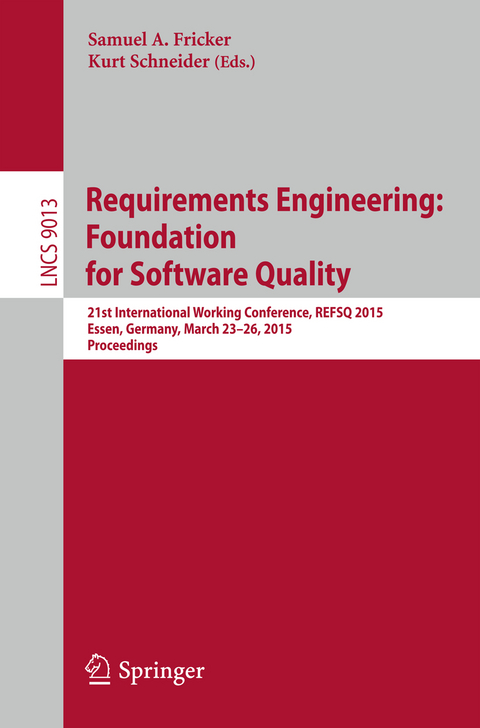
Requirements Engineering: Foundation for Software Quality
Springer International Publishing (Verlag)
978-3-319-16100-6 (ISBN)
Dr. Kurt Schneider leitet das Fachgebiet Software Engineering an der Leibniz Universität Hannover. Er hat in Erlangen Informatik studiert und anschließend an der Universität Stuttgart promoviert. Bei einem Forschungsaufenthalt an der University of Colorado at Boulder beschäftigte er sich mit Techniken zum systematischen Lernen aus Erfahrung im Software Engineering. Er war sieben Jahre bei der DaimlerChrysler AG am Forschungszentrum Ulm tätig. In Projekten mit verschiedenen Unternehmensbereichen spielten Softwarequalität, Prozessgestaltung und wiederum die Erfahrungsnutzung eine wichtige Rolle. Zu seinen Forschungsthemen gehören daneben Softwareanforderungen und agile Methoden, um Informationsflüsse und Dokumentationen in Softwareprojekten zu optimieren. Kurt Schneider legt viel Wert darauf, diese Themen praxisnah zu bearbeiten und vermitteln.
Experimental Validation of a Risk Assessment Method.- Supporting the Validation of Adequacy in Requirements-based Hazard Mitigations.- Evaluating Feature Models: A Goal-Question-Metric Study at Opel.- Modeling and Reasoning about Information Quality Requirements.- Detecting and Correcting Outdated Requirements in Function-Centered Engineering of Embedded Systems.- Estimating the Implementation Risk of Requirements in Agile Software Development Projects with Traceability Metrics.- The Role of Catalogues of Threats and Security Controls in Security Risk Assessment: An Empirical Study with ATM Professionals.- Analyzing and Enforcing Security Mechanisms on Requirements Specifications.- From Stakeholder Requirements to Formal Specifications through Refinement.- Towards More Efficient Requirements Formalization: A Study.- How Artifacts Support and Impede Requirements Communication.- Consonance between Networked Economic and IT Services: Finding the Balance Between Conflicting Requirements.- The Emerging Requirement for Digital Addiction Labels.- Challenges of the customer organizations requirements engineering.- (RE) process in the outsourced environment A case study.- A Case Study Evaluation of the Guideline-Supported QUPER Model for Elicitation of Quality Requirements.- Towards Crowd-based Requirements Engineering.- Functional Requirements Modeling for Interactive TV Applications.- Flexi View: A Magnet-Based Approach for Visualizing Requirements Artifacts.- Requirements Engineering in the Bidding Stage of Software Projects A Research Preview.- A Systematic Literature Review of Requirements Prioritization Criteria.- Embedding Stakeholder Values in the Requirements Engineering Process.- Supporting Requirements Feedback Flows in Iterative System Development.- User-Constrained Clustering in Online Requirements Forums.
| Erscheint lt. Verlag | 12.3.2015 |
|---|---|
| Reihe/Serie | Lecture Notes in Computer Science | Programming and Software Engineering |
| Zusatzinfo | XIV, 333 p. 63 illus. |
| Verlagsort | Cham |
| Sprache | englisch |
| Maße | 155 x 235 mm |
| Gewicht | 534 g |
| Themenwelt | Informatik ► Software Entwicklung ► Requirements Engineering |
| Schlagworte | clustering and classification • Computer Games • Crowdsourcing • Data Mining • Decision Making • Embedded Systems • formal methods • Functional Requirements • Model-Driven Software Engineering • Modeling • Natural Language Processing • Ontologies • Quality assurance • Reliability • Requirements Analysis • risk assessment • safety requirements • software development • Software engineering • Software Engineering / Softwareentwicklung • Softwareentwicklung • Software Verification and Validation • Text Mining • Visualization |
| ISBN-10 | 3-319-16100-8 / 3319161008 |
| ISBN-13 | 978-3-319-16100-6 / 9783319161006 |
| Zustand | Neuware |
| Haben Sie eine Frage zum Produkt? |
aus dem Bereich


